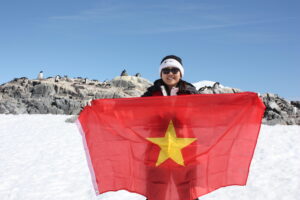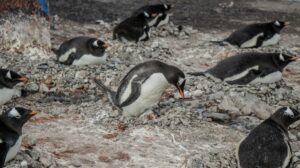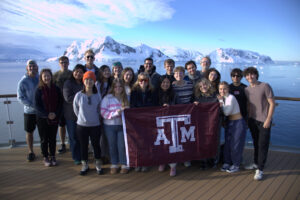When people think about Antarctica, they often picture its unique ecosystem, magnificent glaciers, and intense climate that allows only the toughest to survive. Well, that’s true. But here’s what stands out to me about Antarctica: There are two letters “C” in the word itself. And coincidentally, the first lesson I learned when encountering this seventh continent was about Connection and Community.
I came to the class as a misplaced puzzle piece of an international student, an arts major, and a graduate student among American undergraduates who specialized in fields like science, ecosystems, and environmental studies. I think, and memorize in a visual way; my peers talk and brainstorm analytically. So it’s reasonable when I set myself a plan of a loner focusing solely on my work during the whole field trip.
But my peers mixed them all up.
It started at the airport when I randomly sat next to Nicole while getting our luggage checked. Afterward, we were told to wander around until it was time to board. I stayed behind, pretended to be busy with my work, secretly hoping to avoid the awkwardness of wandering alone. Nicole and Darynne, however, lingered nearby, chatting for ten minutes. To my surprise, they didn’t leave. Instead, Nicole turned to me and asked, “Are you done with your work? Do you want to come with us?”.
And that was the beginning of our friendship, as well as my growing confidence throughout the trip.
A lot of time I don’t really understand what people say. Living in a foreign country is never easy, as language is not just about understanding words and grammar; it’s about culture. People talk about topics and use slang that you don’t understand. How was I supposed to know that Benny Blanco was Selena’s fiance or that he had just proposed to her? But for my friends, that I’m being quiet is never a problem. They feel okay being nonstop speakers so that I can comfortably be a silent listener. Sometimes, they check in with me to ensure I’m still involved and laugh at whatever I say, even if it isn’t witty.
Emma and Cole made it a point to find me in the cabins, worried I might fall into the Antarctic Ocean if I wandered off. Susan always often offered to take pictures of me, knowing I was too preoccupied with photographing penguins and orcas to capture moments of myself. Mathew, with his genuine warmth, would ask daily, “Are you doing okay?” All of this care and kindness happened naturally, without me ever voicing my needs. Their delicacy and thoughtfulness were simply part of who they were.
Their warmth shattered my plan to stay detached. It seems like when you’re happy, everything you do, including work, feels more meaningful. During the trip, I laughed often, and the creative block that had stalled my photography ideas for an entire semester disappeared. My friends’ encouragement helped me develop concepts for photo albums, and I began observing Antarctica through an artistic lens. I noticed how everything in Antarctica embodies Community. Penguins nest close to each other, the females laying eggs and passing them to their mates. We witnessed the extraordinary rare sight of twelve orcas migrating together. Isn’t it remarkable how Connection and Community are woven into the very fabric of nature, from humans to animals?
This realization brought me to a broader lesson: the essential role of the two “C”s in fostering sustainable leadership.
Leadership, at its core, relies on individuals coming together. To promote sustainability, leaders must first help people believe that small actions can lead to significant change. It’s not about imposing strategies or delivering impersonal plans, it’s about building trust and connection. A great leader ties individual beliefs into a shared purpose, guiding people toward the ultimate goal.
This trip taught me that leadership is less about authority and more about building relationships. Connection creates trust, and community fosters action. Together, they create the foundation for meaningful and lasting change. As I move forward, I hope to embody these principles, using what I learned from Antarctica to inspire others toward a more sustainable and connected future.




